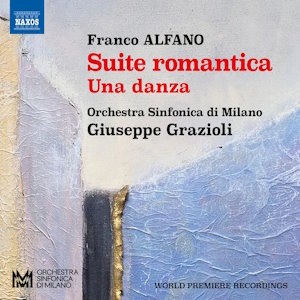
Franco Alfano (1875-1954)
Suite romantica (1906-1908)
Una danza (1948-1950)
Nenia for solo accordion (1951)
Divertimento per orchestra ridotta e pianoforte obbligato (1934)
Amour… Amour (1928)
Davide Vendramin (accordion)
Vittorio Rabagliati (piano)
Orchestra Sinfonica di Milano/Giuseppe Grazioli
rec. 2022, Milan, Italy
Naxos 8.574533 [75]
Of the ending of Turandot, Puccini wrote: “it should have something about it of the grand, the bold, the unexpected, and not leave things where they began”. It had to represent the triumph of love over everything. “These two beings, who stand […] outside the world, are transformed into humans through love, and this love must take possession of everybody on the stage in an orchestral peroration”.
Puccini did not finish the opera. The impossible task went to the very unwilling Franco Alfano. Puccini would have doubtless found a unique, unforgettable melody to crown his sumptuous score, but Alfano found none. He was then treated shabbily by Toscanini who first conducted Turandot. He butchered Alfano’s completion, much to the composer’s bitter resentment.
My point: Puccini had a unique, enviable gift for wonderful, singable melody, so much so that his name has become synonymous with the general public’s idea of Italian opera. On the evidence of Suite romantica and the other pieces on this disc, Alfano was not in the Puccini league, even if he could write attractive music that worms its way into one’s memory if repeated often enough.
One work here, Nenia, did not please me, but I admire the accordionist’s skill. I find it monotonous, without melodic distinction worthy of repeated listening.
The Suite romantica was a most pleasant surprise. That it because I read the booklet notes first. They tell us that the first performance under the baton of Egisto Tango (at what was then the prestigious Augusteo Concert Hall) met with lukewarm success. Alfano left after the first movement. The Italian composer Sgambati’s comments were reticent. Alfano had attempted to express the feelings of two lovers as they toured Italy. The movements are not ‘Picture Postcards’, but a sentimental journey evoking the atmospheres as the lovers travel from Venice to Naples, Alfano’s home city.
The opening movement is a highly romantic and very hummable Notte adriatica. It could make a fine love theme for a romantic film. It is played lusciously here. The strings of the Milan Orchestra sound very well indeed. The second movement, Echi dell’Appennino, is pastoral with stylized rustic dancing. The third movement, Al chiostro abbandonato, has the lovers stop in an abandoned monastery. The music represents the sound of muffled church bells and plainchant. It becomes romantic again, and the two suddenly realise that they are about to commit sacrilege. They leave, trembling with emotion. The final movement, Natale campano, has music representing Neapolitan Christmas festivities, with excerpts from carols and dances. It brings the movement a rousing close following on from a harp-led central section, which rises to a devotional climax.
This work alone is worth more than the modest cost of this disc. It should have been recorded as often as The Pines of Rome. It is not as stupendous in its climaxes as Respighi’s piece, but the images it is trying to evoke are very different. I like it very much.
Una danza shows Alfano’s move towards French Impressionism. Its fourteen minutes of iridescent sonorities are most pleasing. In all this orchestral gorgeousness, however, there is a distinct lack of thematic memorability.
Amour… Amour from 1901 apears here in an orchestral version. It consists of a pleasant, gentle waltz whose main tune is repeated over and over. Nice to listen to, but short on imagination.
Like many composers at that period, Alfano was drawn to the sparer sonorities and sprightly rhythms of neoclassical music. His contribution to the genre is the Divertimento per orchestra ridotta e pianoforte obbligato, a concerto for small orchestra with piano obligato. It is memorable, with a dance-like lightness in the balance between reduced orchestra and piano. At only sixteen minutes, not the usual concerto length, pianists may not wish to learn it. That is a pity. The first two movements are delightful, and I have little doubt that the work could become popular if it were performed more.
If, like me, you had written Alfano off because of the ending of Turandot, reconsider. I heartily recommend this disc. The booklet in English and Italian has plenty of biographical and musical detail.
Jim Westhead
Buying this recording via a link below generates revenue for MWI, which helps the site remain free




















